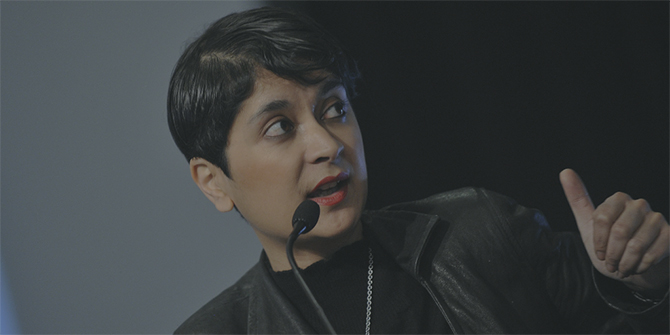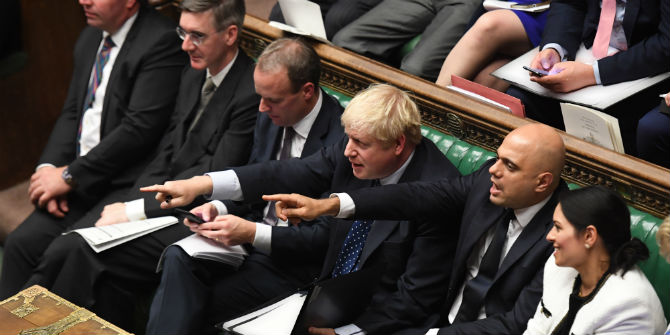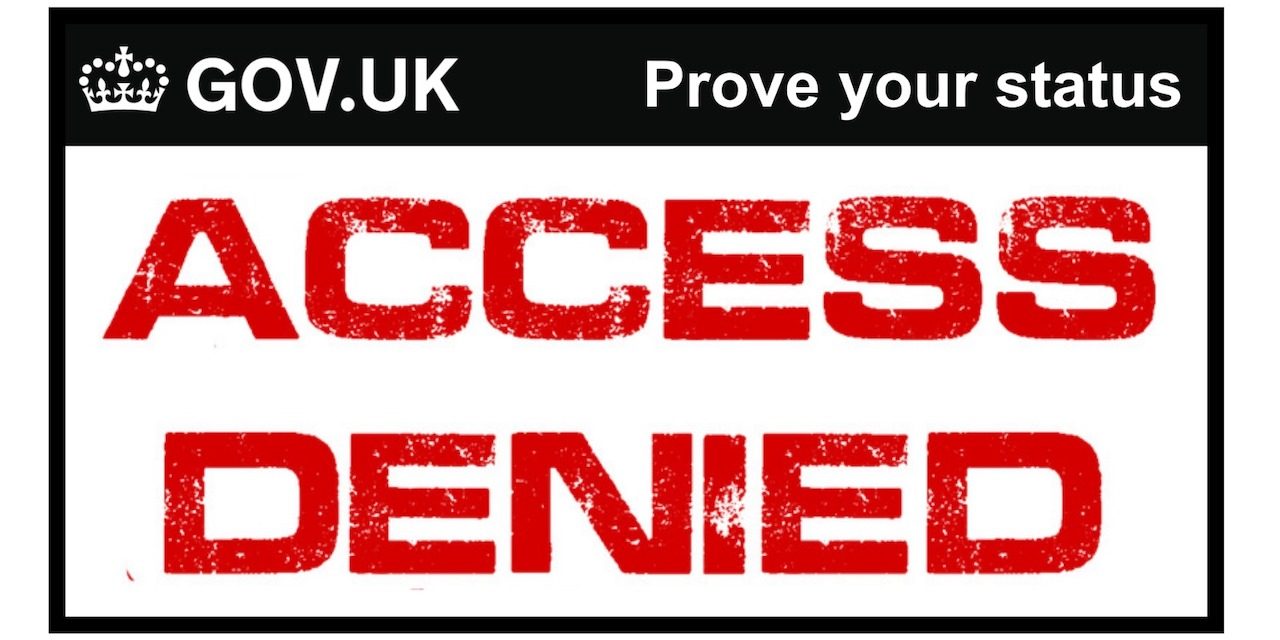 In October 2016, the leader of the UK’s Labour Party, Jeremy Corbyn, appointed Shami Chakrabarti as Shadow Attorney General for England and Wales. In a discussion with British Politics and Policy editors Artemis Photiadou and Tena Prelec, she reflects on the challenges and advantages of the position, the situation faced by EU citizens living in the UK, and the key issues on the horizon for British politics.
In October 2016, the leader of the UK’s Labour Party, Jeremy Corbyn, appointed Shami Chakrabarti as Shadow Attorney General for England and Wales. In a discussion with British Politics and Policy editors Artemis Photiadou and Tena Prelec, she reflects on the challenges and advantages of the position, the situation faced by EU citizens living in the UK, and the key issues on the horizon for British politics.
How have you found the transition from being a high-profile practitioner to being a frontline politician?
It’s a major transition even though I was a very public practitioner and a very activist practitioner, and at times saying very difficult things, during the War on Terror for example. Even so, becoming partisan at this moment, when the referendum campaign was happening and when there was a lot of strife within the Labour Party, was quite something. And, of course, our media is not exactly the most kind or fair – the difficult transition is about learning to wear more armour emotionally. It’s really the temperature of the scrutiny – and sometimes abuse – that was possibly the bigger challenge.
In terms of the actual skillsets and work, that doesn’t seem such a difficult transition. Because solving legal problems and applying law to policy is something I was reasonably familiar with first as a government lawyer, then as a human rights lawyer, and then as Director of Liberty.
Over a year on, I feel that it was worth it because of the unique challenge and opportunity that we face in British, and European, and world politics – it is a radical political moment, and it goes one way or another. I tend not to be a natural combatant, I don’t like picking fights, I don’t like building walls. But when other people build a wall, I know which side I am going to be on. I felt an ethical, moral duty to get stuck into British politics at this extraordinary moment.
As a lawyer, do you think it’s a problem that the Attorney General is also an MP?
No, but two things are crucial. One is that they must be supported on a day-to-day basis – particularly in government rather than in shadow government – by independent private practitioners; and the second is that the person who occupies this role has to think of themselves as a lawyer first, and politician second. That is what I think the great Attorneys General do.
Two of the best Attorneys of my adult lifetime have been Lord Williams of Mostyn on the Labour side – who I had the privilege of working with when I was a young government lawyer – and my learned friend Dominic Grieve from the Tory side. And what they had in common when they occupied that position is that they were lawyers first and politicians second. And this is how I intend to perform the role.
Isn’t there still a conflict of interest?
Actually, being political gives you some advantage. Being in the room is important. In a fast-moving political discourse and in a big complicated economy and state – where there is so much law – the lawyer has to be in the room. I learnt that as a government lawyer when I was completely independent politically. If you are not involved when the policy discussions are happening, you will get in the room to advise way too late. And I would apply that to the military as well: when drone strikes are ordered, who is the lawyer in the room? And to business too – the Bank of England, or News International, or Coca-Cola: when people are making all sorts of important decisions that will affect millions of people, was there a lawyer in the room?
I fundamentally disagree with the idea that you keep the Attorney or the Shadow Attorney out of the room in order to preserve their independence. Their independence can ultimately only be preserved with their own values and the solidarity and support of external lawyers. But they’ve got to be in the room! Otherwise bad things happen.
What did you think of the House of Lords before you became a peer, and what now?
I’ve been on a journey with this. When I was an undergraduate at the LSE at the age of 18 or 19, if I was asked to justify the House of Lords in an essay – what do you need to write? “NO!” And maybe for extra credit: “Hell no!”
Then later, as a government lawyer working on legislation, I realised that some of the most important scrutiny happens in the second chamber, and some of the best scrutineers are in the second chamber. On some of the biggest civil liberties issues, for example the war on terror, it was the Lords, not the Commons, that ended 42-day detention without charge, and stood up for all sorts of other human rights issues.
That said, having now entered the Lords, I am on another part of my journey. I recognise that it’s way too big and needs to be more efficient. It needs to protect its legitimacy with reform. The House of Lords needs to be smaller and we need to think about the method of appointment. It’s not the most urgent priority of the country at the moment with Brexit, but it is not sustainable as it is.
And what would broader constitutional reform look like under Labour?
I personally think that constitutional reform ought to be approached in a more measured and wholesale way than just doing little bits and pieces. Sometimes you can move a widget here and undermine something over there. The ideal for me would be some years into a Labour government, and after a cross-party, cross-nation, intergenerational constitutional convention, then you might look again at various parts of the constitutional settlement, and quite possibly a written constitution. And the House of Lords would be part of that discourse.
As a student – and I still consider myself a student of politics and the constitution – I thought if it ain’t broke don’t fix it. Now I think the constitution is broke. Because so many of the unwritten constitutional conventions have been trampled upon. I think at some point it will become unsustainable not to actually sit and write it all down with public consultation. If you want it to last for say 500 years, you better spend at least 5 or 10 years in a bipartisan, cross-regional way getting it right. If we are going to do this, it’s going to have to be a massive project, and there has to be maximum involvement, consultation, legitimacy.
Now on the more urgent priorities you mentioned – you have in the past expressed concerns that Britain could become a tax haven after Brexit. Is it still heading that way?
I think there is a very real risk that the Government want to use Brexit as a power grab for their kind of politics and executive domination of Parliament, but also a highly de-regulated City of London that turns a blind eye to tax dodging and all sorts of regulatory breaches in order to compete with Frankfurt and Paris. Whereas under Jeremy Corbyn, Labour’s vision is the opposite of that. In terms of workers’ rights, environmental rights, equalities, ethical business – we have to match European standards, if not raise them. And I have already committed on behalf of the government-in-waiting, after consulting my shadow Cabinet colleagues, to public registration of beneficial ownership for foreign companies investing in UK property.
Frankly, the two parties have very dramatically different visions of what this country should look like beyond Brexit. The Conservatives want a race to the bottom and we want a race to the top. We want to sell the City of London and the UK economy on the basis of the rule of law and progressive values, and the Conservatives want to say come and hide your money here and pay no tax and no wages, and have no standards, no employment protection, etc.
Still on Brexit – what is your view on guaranteeing the rights of EU nationals living here?
Jeremy Corbyn was pretty explicit about this and chose to make it a key part of his speech at the party conference in Brighton – they have an absolute and unqualified right to remain. We would have done this the day after the referendum if we were in government. That is what any decent, humane, responsible PM should have done. These people have been in limbo for nearly 18 months now. Absolutely unacceptable. I have friends who are married to UK nationals and they have children here, and the mother or the father doesn’t know whether they are going to be able to stay because no guarantee has been given.
I have to tell you, it’s personally embarrassing – forget party politics. Jeremy Corbyn has guaranteed it and if he didn’t I wouldn’t be his Attorney General. But unless we are in government, these people are in limbo. The fact that people and human rights are being used as a bargaining chip is absolutely extraordinary, it’s immoral. These people have been living and working, and serving our communities, sometimes all their adult lives.
I feel very strongly about this because I was the child of migrants myself. I remember them speaking with anguish when the atmosphere seemed to be changing in the 1970s – it seemed that it was getting less comfortable and they ended up becoming British citizens because they were worried. So I have some insight of what it feels like – it’s cruelty. It’s not politics, it’s cruelty that gives people nightmares about whether they will be separated from their family and their lives.

It’s been a year since your report on antisemitism in the party. What is your assessment of progress since?
The most important thing that we are very happy about is that the National Executive Committee of the Labour Party, which is famously factional, unanimously supported my suggested rule change that was necessary to implement the report. It’s a shame that these bureaucratic things take so long, but that’s democracy.
We had 96% of delegates voting for rule change. The 4% that either abstained or voted against I am confident only did so because one speech on the conference floor was completely misguided and was suggesting that I wanted to purge people for pro-Palestinian views, which is plainly not my intention or the effect of the rule. But it’s what probably stopped it from being 100%. But given we have the largest membership of any political party in Western Europe, 96% is pretty good.
It’s not helpful and it’s very frustrating when some old white men – who are otherwise amazing and have made their contribution – go around the TV studios saying they never experienced antisemitism or racism. Guess what, they’ve never experienced misogyny either. I just wish they would read my report. Because I investigated for two months and set out my findings in the report and would like to see other parties, including the Conservative Party, look at all forms of racism in their ranks too.
I take some heart from the fact that I was commissioned to do the report, did the report, and now the democratic machinery is catching up with the recommendations to actually deliver the disciplinary change that’s required.
Baroness Chakrabarti is a British Labour Party politician and member of the House of Lords. She is a barrister and currently the Shadow Attorney General for England and Wales.
Shami Chakrabarti spoke at an LSE event, hosted by the Department of Law. A podcast of the event is available here. This article originally appeared at our sister site, British Politics and Policy. It gives the views of the interviewee, not the position of LSE Brexit or the London School of Economics. Featured image credit: Southbank Centre (CC BY 2.0)






